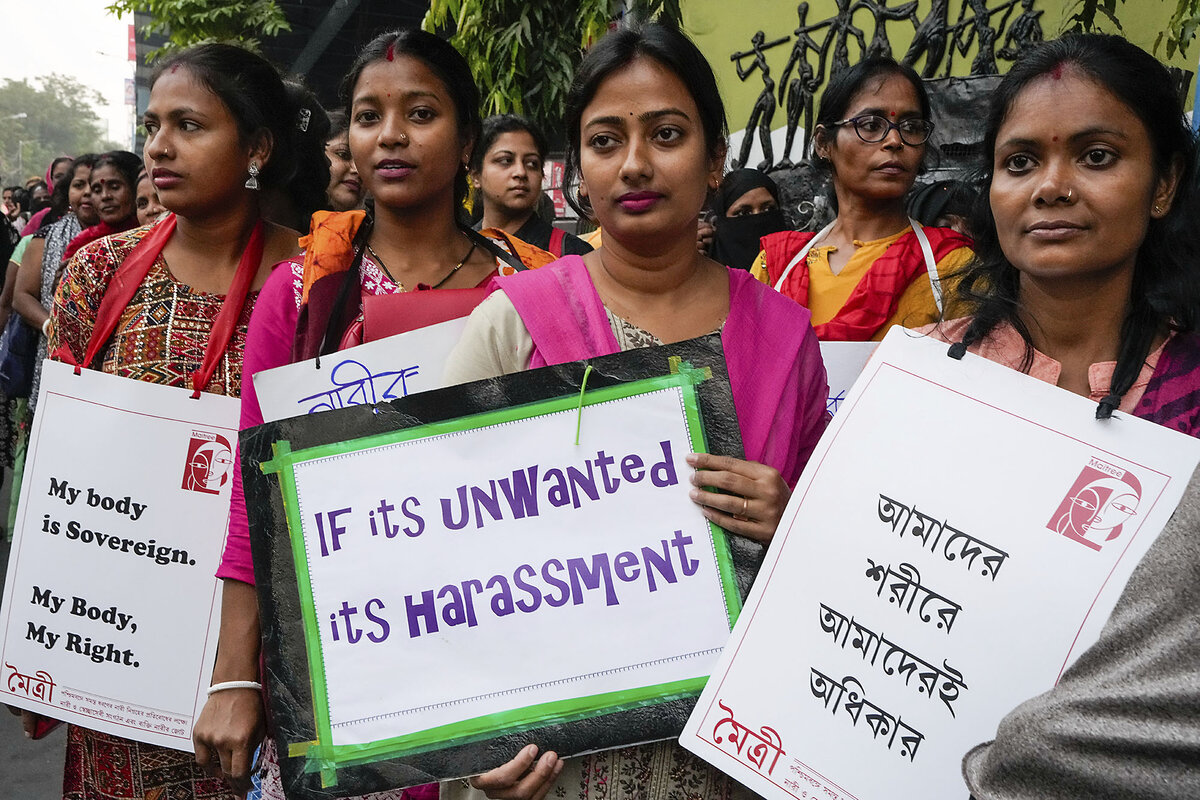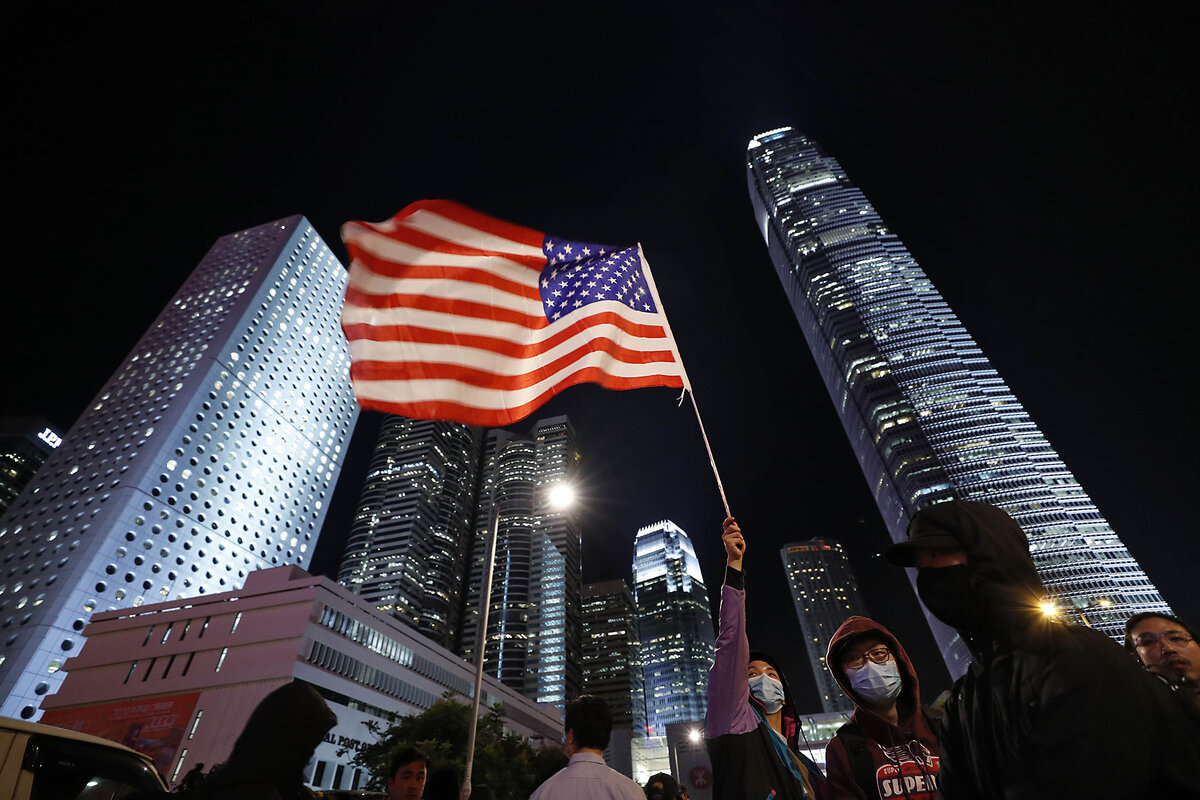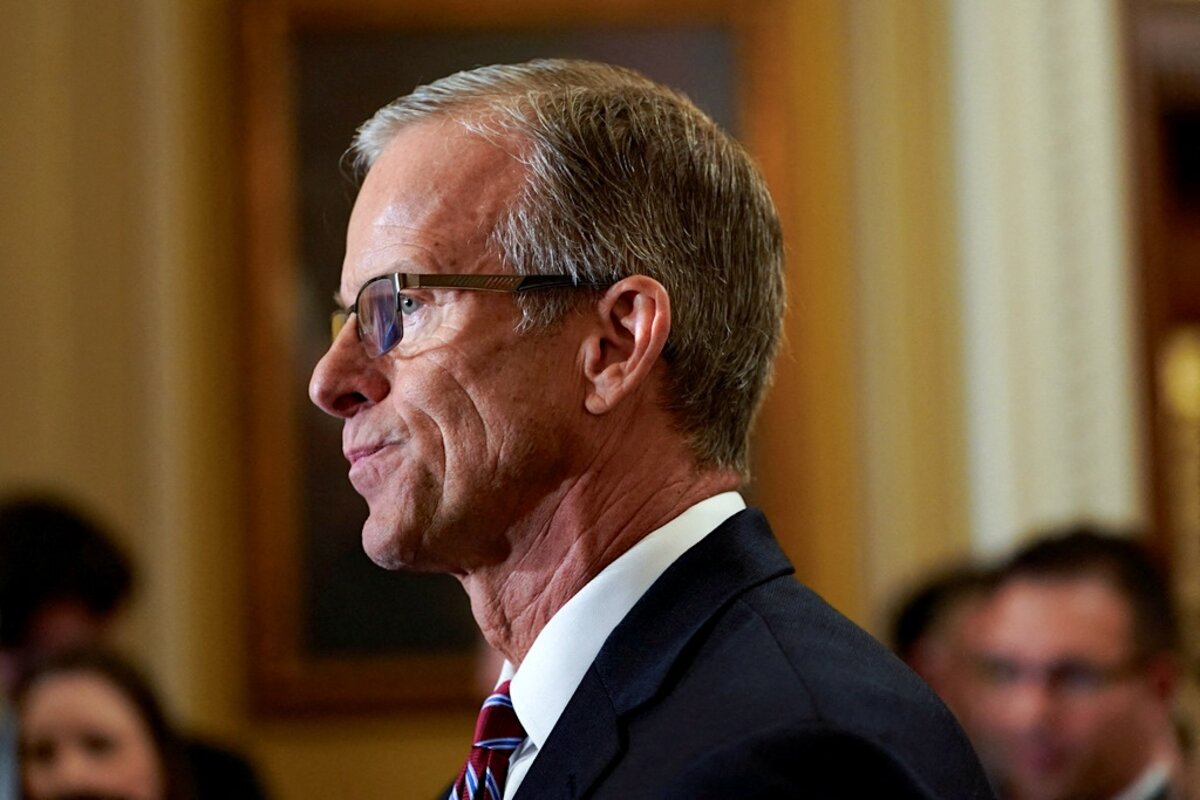• Move to dismiss Trump charges: Federal prosecutors move to dismiss the criminal charges against President-elect Donald Trump that accused him of plotting to overturn the 2020 election and to abandon the classified documents case against him.
• Haitian gangs recruit children: A new UNICEF report finds that the number of children recruited by gangs in Haiti surged by 70% in the past year.
• Plastic pollution treaty: A round of negotiations on a legally binding treaty to address plastic pollution has opened in Busan, South Korea.
• Bible teachings in Texas: Texas’ education board has voted to allow Bible-infused teachings in elementary schools.
• Uruguay presidential election: Uruguay’s leftist candidate, Yamandú Orsi, becomes the country’s new president in a tight runoff election that ousted the conservative governing coalition.

Why is Christian Science in our name?
Our name is about honesty. The Monitor is owned by The Christian Science Church, and we’ve always been transparent about that.
The Church publishes the Monitor because it sees good journalism as vital to progress in the world. Since 1908, we’ve aimed “to injure no man, but to bless all mankind,” as our founder, Mary Baker Eddy, put it.
Here, you’ll find award-winning journalism not driven by commercial influences – a news organization that takes seriously its mission to uplift the world by seeking solutions and finding reasons for credible hope.
Explore values journalism About usMonitor Daily Podcast
- Follow us:
- Apple Podcasts
- Spotify
- RSS Feed
- Download
 Mark Sappenfield
Mark Sappenfield
The big question on many people’s minds, both in the United States and abroad, concerns what President-elect Donald Trump is actually going to do. His first term offers some clues as to how rhetoric became policy (or not). But much has changed.
Today, Ann Scott Tyson asks this question about Mr. Trump’s China policy. She shows how two core elements of Mr. Trump’s political identity are in conflict on China. How he manages that balance will be something to watch.
Already a subscriber? Log in
Help fund Monitor journalism for $11/ month
Monitor journalism changes lives because we open that too-small box that most people think they live in. We believe news can and should expand a sense of identity and possibility beyond narrow conventional expectations.
Our work isn't possible without your support.
News briefs
Today’s stories
And why we wrote them
( 5 min. read )
The pro-settlement movement in Israel is exulting at what it perceives as a possible green light from the incoming Trump Middle East team to pursue annexation of the West Bank, even without the support of the broader Israeli public.
( 5 min. read )
Several of Donald Trump’s Cabinet picks are China “hawks.” His choice for secretary of state, Marco Rubio, shows the tensions between ideology and pragmatism that will be at play in his administration’s relationship with Beijing.
( 4 min. read )
Temporary protected status allows certain immigrants to stay in the U.S. without the threat of deportation. President-elect Trump aims to revoke its use, particularly for Haitians in Springfield, Ohio.
( 5 min. read )
Many of the countries that formed out of the Soviet Union aspired to link their future with the West. But European troubles and Russian aggressiveness are pulling their focus back toward Moscow.
Books
( 5 min. read )
Reading picture books aloud is soothing for both children and adults. Celebrating good things, acknowledging worries, and giving and receiving help are all messages to savor.
The Monitor's View
( 2 min. read )
Four years ago, just days into the Biden administration with the Senate divided down the middle, the senior senator from South Dakota rose in eloquent defense of deliberation and compromise.
“Our Founders recognized the importance of putting safeguards in place to ensure that majorities wouldn’t curtail or eliminate minority rights,” said John Thune, a Republican, from the Senate floor. “They made the Senate smaller and senators’ terms of office longer, with the intention of creating a more stable, more thoughtful, and more deliberative legislative body to check ill-considered or intemperate legislation or attempts to curtail minority rights.”
Those words are freshly relevant. Mr. Thune is the newly elected leader of the incoming Republican Senate majority. In one of his first statements in that role, amid a hail of controversial Cabinet picks from Donald Trump, he vowed to preserve the filibuster – a legislative tool that compels consensus.
That decision was unlikely to curry favor with the president-elect, who prizes loyalty and has urged the Senate to abdicate its constitutional role of weighing nominations through “advice and consent.” But it reinforced a guardrail. Last week, his first choice for attorney general, Matt Gaetz, withdrew after Republicans in the Senate expressed their unwillingness to overlook the former Florida congressman’s alleged criminal misconduct.
The Senate’s early gestures of independence underscore that governing rests on ideas as much as it does on the people who hold powerful jobs. The framers of the American Constitution established a system of checks and balances among three equal branches. In the Senate, that equilibrium draws on what James Madison called “the stability of character.”
Its mandate of consent for appointments to senior positions in the executive and judicial branches upholds a moral agency to reject or approve. When the late Senate Majority Leader Robert Dole was asked how he approached his work in Congress, he described it this way: “Well, I’m going to sit back and watch for a few days, and then I’ll stand up for what I think is right.”
“America has never achieved greatness when Republicans and Democrats simply manage to work together or tolerate each other,” Mr. Dole wrote in an op-ed published in The Washington Post shortly after his death in 2021. “When we prioritize principles over party and humanity over personal legacy, we accomplish far more as a nation.”
Republicans claimed a broad mandate after winning the White House and both chambers of Congress. Yet unified government is no guarantee of unanimity in governing. In the three weeks since, many in the Senate have tempered party allegiance with individual reason.
“All Americans, whether or not they’re in the majority, deserve to be represented,” Senator Thune said four years ago. Deliberation “requires more thought, more debate, and greater consensus.”
A Christian Science Perspective
Each weekday, the Monitor includes one clearly labeled religious article offering spiritual insight on contemporary issues, including the news. The publication – in its various forms – is produced for anyone who cares about the progress of the human endeavor around the world and seeks news reported with compassion, intelligence, and an essentially constructive lens. For many, that caring has religious roots. For many, it does not. The Monitor has always embraced both audiences. The Monitor is owned by a church – The First Church of Christ, Scientist, in Boston – whose founder was concerned with both the state of the world and the quality of available news.
( 3 min. read )
Prayerfully leaning on God as the divine Principle of all enables us to stop any cycle that doesn’t further spiritual goodness in our lives.
Viewfinder

A look ahead
Thank you for spending time with us today. Please come back tomorrow when Francine Kiefer looks at how President-elect Donald Trump’s economic team is taking shape. It includes some built-in tensions that reflect Mr. Trump himself.








